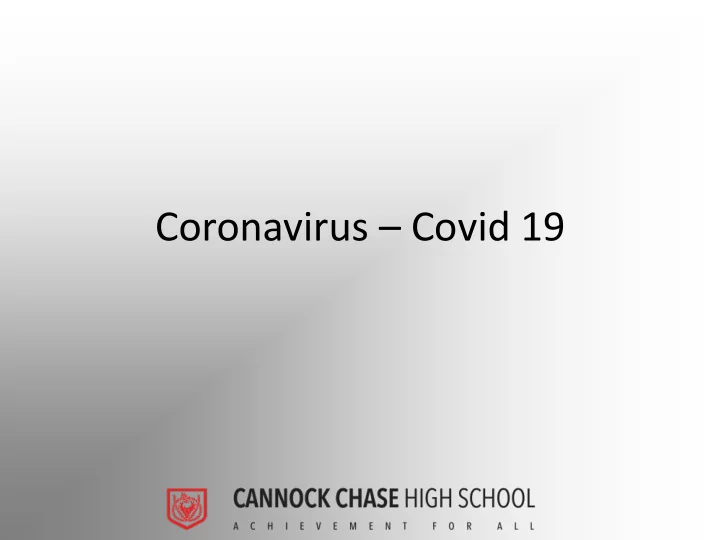

Coronavirus – Covid 19
School Closure • Currently the message from the PM is that schools are to remain open. We will inform you if and when this changes. • Children are least at risk from the virus. • However, you should not attend school and should self- isolate for 14 days if you, or anyone in your household, have the following symptoms: – a high temperature – you feel hot to touch on your chest or back; – a new, continuous cough – this means you've started coughing repeatedly.
Why should I continue to come to school? • The education that you receive in school cannot be replicated at home (no matter how effective home learning is). Make the most of the time that the school will be open! • This is not the same as having a 6 week holiday! You will not be allowed to socialise, go to cinemas, go ice skating, go shopping. You will be reducing social contact for what might be months. Make the most of the time that you have with your friends in the school setting.
Accessing Work – systems Electronic Home Learning • ‘Show my Homework’ - Do you have your log in/pin? (collect paper copy from tutor) • E-mail – access your CCHS e-mail account (CCHS----@cannockchase-high.staffs.sch.uk) Normal school password. (please put your full name on the e-mail as otherwise we just see your CCHS number!) • FROG – CCHS---- and same password as normal Details of how to access all these systems are on the school website in a page called ‘Coronavirus Advice’ (under the “For Parents” section).
Who do I contact if I need help? • Help with home learning: e-mail classroom teacher (using school e- mail address) and include the Director of Learning Community. If you do e-mail a member of staff using another e-mail address then this is the message that you will receive: ‘Thank you for your email but I am unable to respond further to this address. Please contact me via your school email account.’ • Help with accessing school systems: SMHW/SIMS parent App etc (Miss Simpson). • Pastoral Help/support: Your tutor (via e-mail) or your Director of Year. If more serious concerns - Miss Worrall and members of the Leadership Team (Mrs White). • Safeguarding:
Communication with your Parents • Regular e-mails sent to their registered e-mail address (let us know if this changes or has changed). • SIMS Parent App. • Regular updates on Facebook/Twitter and Instagram.
Principles of Home Learning • Students should expect to receive updates on Show My Homework each morning for their five timetabled lessons on that day. • Work should be planned with the intention that completion will take approximately one hour when undertaken by students. • In the short term, work predominantly focuses on consolidation/ interleaving/revision given the challenges of delivering new learning remotely. • Students with capacity to do so, should be able to submit work to teaching staff for feedback both via Show My Homework (online uploads) and/or email; staff are asked to provide a response to student submissions within 24 hours and feedback on submitted work should be returned in a timely manner.
Principles of Home Learning • Work should be set by tutors twice weekly to continue the PSHE curriculum with all Year groups. • If a staff member is off sick then Directors of Learning Communities will be responsible for setting work.
Your education - now your responsibility! • You need to be disciplined in accessing, completing and submitting work. • Start and maintain new home learning routines. • Contact us via e-mail if you need any help or support with anything.
Social Distancing – How? (Subject to change) 1. Avoid contact with someone who is displaying symptoms of coronavirus (COVID-19). 2. Avoid non-essential use of public transport, varying your travel times to avoid rush hour, when possible. 3. Avoid large gatherings, and gatherings in smaller public spaces such as pubs, cinemas, restaurants, theatres, bars, clubs. 4. Avoid gatherings with friends and family. Keep in touch using remote technology such as phone, internet, and social media. 5. Use telephone or online services to contact your GP or other essential services.
Your Mental Health Stay connected and maintain your social networks. Even in situations of isolations, try as much as possible to keep your personal daily routines. If health authorities have recommended limiting your physical social contact to contain the outbreak, you can stay connected via e-mail, social media, video conference and telephone. During times of stress, pay attention to your own needs and feelings. Engage in healthy activities that you enjoy and find relaxing. Exercise regularly, keep regular sleep routines and eat healthy food. Keep things in perspective. Public health agencies and experts in all countries are working on the outbreak to ensure the availability of the best care to those affected. A near-constant stream of news reports about an outbreak can cause anyone to feel anxious or distressed. Seek information updates and practical guidance at specific times during the day from health professionals and WHO website and avoid listening to or following rumours that make you feel uncomfortable.
How to Help! • Do not hang around Cannock in large groups or cause any trouble in the local community - you are stretching resources, such as policing, that are already stretched with the outbreak. • Help each other by communicating and checking that friends and vulnerable people in society are ok.
Values • Integrity • Teamwork • Responsibility • Excellence • Resilience
Make yourself and the school proud!
Recommend
More recommend